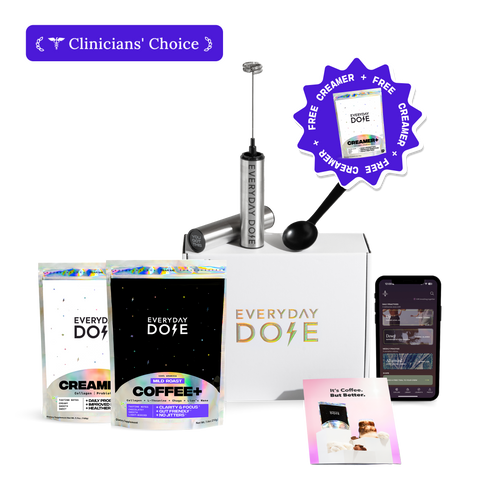Is Mushroom Coffee Good for Your Liver? A Scientific Look

Mushroom coffee is the latest buzz in the wellness world, so you may have heard all about its benefits for your brain. But what about your liver?
The liver is an important organ that does everything from filtering out toxins in your body to supporting digestion, thanks to the bile it produces. If you want to show your body some love, supporting your liver is one of the best places to start!
In this article, we’ll look at whether mushroom coffee can support your liver and which ingredients to look for. We’ll also discuss how to pick the highest quality of mushroom coffee.
First, Can Regular Coffee Support Your Liver?
Mushroom coffee has its own benefits (which we’ll get to in a moment), but let’s not knock regular coffee. Plain old made-from-coffee-beans coffee can also provide some excellent liver support, which is why it makes such a good base for the extra ingredients of mushroom coffee.
Here are some of the ways coffee can support your liver:
- It’s rich in caffeine and chlorogenic acids, which can block adenosine receptors and help minimize systemic irritation in the liver.
- It contains polyphenols like chlorogenic acid and diterpenes, which fight oxidative stress and may encourage the production of antioxidant enzymes in the liver.
- Observational studies show that three or more cups of coffee daily may help ease symptoms of liver disease.
What Exactly Is Mushroom Coffee?
Mushroom coffee is usually exactly what it sounds like — a blend of traditional coffee and functional mushrooms. However, this isn’t always the case, and just seeing “coffee” on the label doesn’t mean you’re getting coffee.
Some brands don’t even contain actual coffee (just herbs or chicory), while others use cheap and convenient mushroom powders instead of extracts that actually work. That’s why it’s important to know what you’re sipping.
At Everyday Dose, we like to do things differently. Our Mushroom Coffee+ includes real Arabica coffee extract (made with a proprietary low-acid extraction process), plus a thoughtful mix of functional ingredients. Think lion’s mane for focus, chaga for antioxidant support, l-theanine to reduce coffee jitters, and collagen for skin, joint, and gut health.
Medicinal Mushrooms and the Liver: What Are the Benefits?
Many mushroom coffees are made to support your brain — some boost focus or jumpstart your motivation, while others supercharge the immune system or physically increase your energy. However, many of the ingredients used in mushroom coffees can actually have benefits for the liver, too, even if these benefits aren’t what they’re known for.
Lion’s Mane
Rodent studies and small lab trials indicate that lion’s mane’s compounds may soothe system-wide irritation and minimize oxidative stress. Though human trials have focused more on mood and cognition, the antioxidant and soothing effects could indirectly benefit liver function.
Chaga
Chaga is a go-to source of antioxidants thanks to its high phenolic and polyphenolic content. According to one review, chaga protected liver cells from oxidative injury and mitochondrial stress, which means it can help keep your liver healthy long-term.
These protective mechanisms are more important than you’d think, since oxidative damage is a potential root cause of many liver concerns. Human research is lacking, but given its strong antioxidant profile, chaga may be a smart choice.
Reishi
Reishi is often dubbed the “mushroom of immortality,” and it earned that nickname in liver studies. Lab and animal research show that its triterpenoids and polysaccharides prevent liver inflammation, reduce fibrosis, and even protect against toxin-induced injury. However, there have been rare reports of liver toxicity with heavy reishi use, so moderation and quality sourcing matter.
Cordyceps
Cordyceps might be known as the zombie fungus, but it can have real benefits for liver health (and we promise it won’t take over your brain). Studies in rodents indicate that this shroom can provide protection against liver fibrosis and reduce portal hypertension (or high blood pressure in the liver). Similarly to chaga, its soothing and antioxidant compounds may help support liver enzymes and protect against injury.
Turkey Tail
Turkey tail is best known for immune help, but its liver profile is interesting, too. Its bioactive polysaccharopeptides (PSP) have anti-inflammatory effects and may support detox pathways, which are important to help the liver bounce back from a heavy workload.
What Are the Pros and Cons of Mushroom Coffee?
Like everything else in life, mushroom coffee has pros and cons. As avid mushroom coffee enjoyers ourselves, we think the pros outweigh the cons, but we’ll put them all here so you can come to your own conclusions.
Pros
- Easy to make — just mix with water and sip.
- Offers more wellness benefits than regular coffee.
- Tastes like coffee (if you’re drinking our Mushroom Coffee+, that is).
- Lower caffeine content helps avoid jitters or crashes.
- Lower acidity can be easier on the stomach.
Cons
- Not all mushroom coffees are made the same. Some contain fillers or weak ingredients, so you should always check the ingredient lists.
- Quality varies wildly between brands, especially when it comes to sourcing.
- It’s best to talk to your doctor before starting, especially if you’re taking medications or managing health conditions (just like with regular coffee).
How To Choose the Right Mushroom Coffee
When you’re shopping for mushroom coffee, the quality of ingredients is everything. A few key details can make or break the benefits.
First, check whether the mushrooms come from fruiting bodies (the part you’d see growing above ground) or mycelium (the root-like structure). Fruiting bodies contain far more active compounds like beta-glucans and triterpenes, while mycelium often includes residual starches from the grains it’s grown on. That’s why our mushroom blends use only 100% fruiting bodies.
Speaking of which, how the mushrooms are fed matters. The mushrooms grown on hardwood generally have more powerful compounds because that’s what they eat in nature. Meanwhile, grain-fed mushrooms are cheaper to grow but tend to be less effective, which is why we use only hand-harvested mushrooms grown on trees.
You should also know whether the product uses extracts (which are concentrated and more bioavailable) or simply dried and powdered mushrooms, which are hard for your body to break down. You may even want to look one step further. Dual-extracted mushrooms (processed with both water and alcohol) are one of the surest ways to get the full spectrum of benefits, which is why we use them in our blends.
The Bottom Line
Mushroom coffee might be a trend, but it’s a trend based on truth. When done right, it blends the energy and liver-loving perks of coffee with the adaptogenic power of mushrooms.
But like any supplement, it’s only as effective as its ingredients. For more tips on how to choose the best mushroom coffee and some ideas on how to use it, check out the Everyday Dose blog today!
Sources:
Liver: What It Does, Disorders & Symptoms, Staying Healthy | Cleveland Clinic
Coffee and your liver FAQs | British Liver Trust
Caffeine in liver diseases: Pharmacology and toxicology | FrontiersIn
5 Lion’s Mane Mushroom Benefits | Cleveland Clinic
Therapeutic properties of Inonotus obliquus (Chaga mushroom): A review | PMC
Ganoderma lucidum: Novel Insight into Hepatoprotective Potential with Mechanisms of Action | PMC
Turkey tail mushrooms act as nonspecific immune modulators | UCLA Health
Start your day
The Right Way









